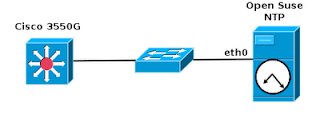Configuring a NTP Time Server
The NTP or Network Time Protocol, is an Internet protocol used to synchronize the clocks of network equipment, important when performing safety analysis, the importance of clock synchronization.

The NTP uses UDP as a transport, using port 123. NTP uses a hierarchical system of strata clock, which starts with the stratum 1, these are the first-level devices are usually synchronized with external clocks such as GPS or an atomic clock. The stratum 2 devices are devices that take or synchronize their time from one or more stratum 1 systems, and so on.
The following manual describes the configuration of NTP service running on a server with Open Suse 11.4 and synchronization with a Layer 3 switch, Cisco 3550G.
Server IP address 172.16.2.2
For configuration is necessary to edit the /etc/ntp.conf
Once these changes have to restart the NTP daemon
Verifying the configuration
In this way it is possible to synchronize the network switching equipment with an NTP server in a simple way, it is also important to synchronize the network and application servers with time servers. This is very important when making any type of monitoring equipment.
Note: For more information about the use, operation and ntp server list visit http://ntp.isc.org/bin/view/Servers/WebHome

The NTP uses UDP as a transport, using port 123. NTP uses a hierarchical system of strata clock, which starts with the stratum 1, these are the first-level devices are usually synchronized with external clocks such as GPS or an atomic clock. The stratum 2 devices are devices that take or synchronize their time from one or more stratum 1 systems, and so on.
The following manual describes the configuration of NTP service running on a server with Open Suse 11.4 and synchronization with a Layer 3 switch, Cisco 3550G.
NTP Server Configuration in Suse Linux.
Distribution: SUSE-11.4 (pakage need xntp)Server IP address 172.16.2.2
For configuration is necessary to edit the /etc/ntp.conf
server 127.127.1.0 fudge 127.127.1.0 stratum 10 server 0.pool.ntp.org server 1.pool.ntp.org server clock.via.net deiftfile /var/lib/ntp/drift/ntp.drift logfile /var/log/ntp
Once these changes have to restart the NTP daemon
linux:~ # /etc/init.d/ntp start Starting network time protocol daemon (NTPD) done linux:~ # chkconfig ntp on
NTP client configuration in Cisco 3550G switch
switch# configure terminal switch(config)# ntp server 172.16.2.2
Verifying the configuration
switch# show running-config ntp clock-period 17180614 ntp server 172.16.2.2
In this way it is possible to synchronize the network switching equipment with an NTP server in a simple way, it is also important to synchronize the network and application servers with time servers. This is very important when making any type of monitoring equipment.
Note: For more information about the use, operation and ntp server list visit http://ntp.isc.org/bin/view/Servers/WebHome
0 Comments:
Post a Comment